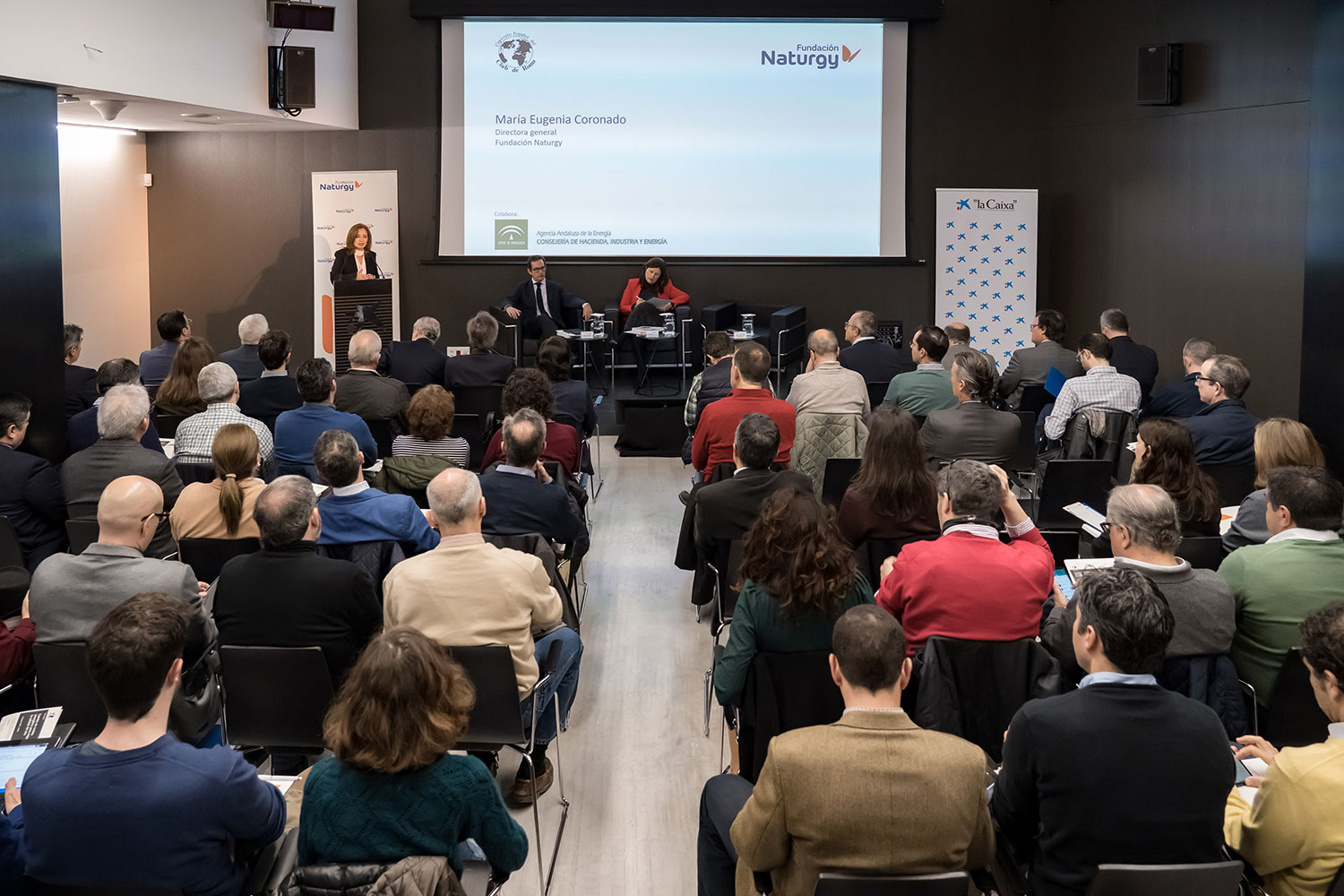Experts call for an improvement in the regulation of biomass for domestic use to improve urban air quality
Representatives from the Administration, companies and the academic world share the opinion that there is a need to continue implementing measures to reduce the pollution rates in cities, during a conference held in Seville.

The domestic use of biomass, mainly for heating, reduces sulphur dioxide emissions, but contributes to an increase in other pollutants that cause a deterioration of air quality in urban environments. This was one of the main messages that emerged today at the "Changing the energy model to improve air quality" conference, organised in Seville by the Naturgy Foundation in collaboration with the Spanish Chapter of the Club of Rome.
Jesús de la Rosa, professor at the University of Huelva, stated that “the downside of biomass is the effects it has on the environment and air quality; it improves CO2 emissions but worsens air quality.” “In general, although the trend is towards improvement, there are extreme cases related to traffic sources, biomass and industrial combustion mainly, which affect both large cities and small municipalities,” explained de la Rosa, who recalled that Andalusia is currently working on various Environmental Quality Plans in order to improve the air quality of its citizens.
For his part, the president of INERCO, Vicente Cortés, also said in his speech that, while renewable electricity production has a clear beneficial effect on pollutant emissions in the EU, domestic use of biomass has a negative influence on emissions of respirable particles.
“Electricity generation from renewable sources accounted for approximately 32% of electricity generation in the EU in 2018, however, the use of biomass in domestic and residential use reduces SO2 emissions in the EU by 3%, but leads to increases in the remaining primary pollutants, such as nitrogen oxides and particles.”
Unlike the use of biomass for electricity generation, which is subject to very strict emission limits, use in small, inefficient facilities without gas treatment systems explains these figures, according to Cortés. In this regard, he stated that a contribution to the reduction of CO2 emissions on a global scale may result in a worsening of air quality on a local scale.
Air quality improvement plans
The Managing Director of the Andalusian Energy Agency, Jorge Jiménez, who spoke at the opening of the seminar, explained that "at the Andalusian Energy Agency, we are working towards the development of a more sustainable energy system, where renewable energies play a very important role and where we have been implementing incentives to support energy efficiency and sustainable transport for years.”
At a municipal level, the Director General of Sustainable Development, Financing and External Action at Seville City Council, Esperanza Caro, who also participated in the opening of the conference, stated that "a change in the energy model is necessary to improve the quality of the air in cities; at Seville City Council we are committed to this through a series of lines of action such as more sustainable mobility, the rehabilitation of homes to make them more efficient and the treatment of waste,” said Caro.
In turn, the Director of Financing, Development and Strategic Projects at the Andalusian Energy Agency, Cristóbal Sánchez Morales, gave a brief summary of the energy and environmental approach to energy policy, as well as the strategic framework for ecological transition and the principle of energy efficiency first, as a strategic way of mitigating the environmental impact of energy uses. In this regard, he reviewed the main energy improvement measures in cities from the perspective of their impact on improving air quality, including the efficient use of renewable energies and, particularly, biomass energy.
Also speaking at the seminar was Jaime Briales, Head of the Innovation, Energy and New Technologies Service at Malaga City Council, who explained, among other issues, the challenges of mobility in this city, which include not only the reduction of CO2 emissions, but also the reduction of noise and air pollution, the recovery of spaces for citizens, the reduction of unsustainable modes of transport and the reduction of travel times. To achieve all this, Malaga City Council is committed to taking advantage of the opportunities offered by electric vehicles, connected vehicles, autonomous vehicles and personal mobility vehicles.
Juan Azcárate, Deputy Director General of Energy and Climate Change at Madrid City Council, explained the air quality plans being implemented in the Spanish capital. Among other issues, he highlighted the importance of having an emissions inventory to support the design, implementation and monitoring of environmental policies. Azcárate also spoke of the need to move towards a change in the energy model, with mobility, building and waste as the main levers of action
Urban pollution and human health
At the opening of the conference, the Director General of the Naturgy Foundation, María Eugenia Coronado, explained that “the World Health Organization has long warned us of the effects of local pollution on human health: 91% of the world’s population breathes polluted air, causing 7 million deaths a year, of which 3.8 million are caused by the air we breathe inside buildings and 4.2 million by the air outside,” she said.
“The influence of energy on air quality is decisive,” said Coronado, who added that “if we focus on outdoor air and air quality in cities, the main agents emitting this pollution and derived from human activity are transport, industry, buildings, and especially, air conditioning with biomass, construction and some agricultural activities.” Coronado also recalled that it is important to highlight the effects of the contribution of natural sources, “such as the intrusions of African air masses that significantly reach this land where we are today”.
The Vice President of the Spanish Chapter of the Club of Rome, José Manuel Morán, was responsible for closing the day, along with Coronado.
Share